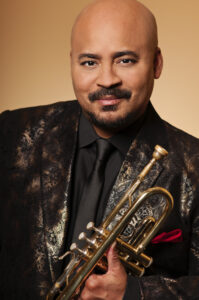
“No one plays absolutely beautifully all the time…unless you’re my cousin Rodney” —Wynton Marsalis
Praised by critics from Fanfare Magazine to American Record Guide, widely renowned trumpeter Rodney Marsalis (’91) has carved out a formidable career on the international music scene since his days studying at Curtis under the guidance of Frank Kaderabek; former Philadelphia Orchestra principal horn, Mason Jones; and Glenn Dodson, former principal trombone of the orchestra. Born in New Orleans, Mr. Marsalis began his musical journey at age six, and by the time he was eleven, he started taking classical trumpet lessons with his cousin, Wynton Marsalis. Hailed from a young age as a “trumpet prodigy,” he made his solo debut at fifteen with the New Orleans Symphony. He then won numerous competitions and garnered national attention at age nineteen, when he was selected to perform as a soloist with the Boston Pops Orchestra.
While at Curtis, Mr. Marsalis practiced trumpet for “five to six hours daily,” and this passion and discipline ultimately led to summers spent as a Tanglewood Fellow under the baton of Leonard Bernstein (Conducting ’41) and being mentored by pianist and Curtis faculty member Rudolf Serkin at both Tanglewood and the Marlboro Music Festival. He then secured titled chairs in the New Orleans Symphony, the Colorado Symphony Orchestra, the San Diego Symphony Orchestra, the Orquestra Sinfonica de Tenerife, the Barcelona Symphony, and the Richmond Symphony. In Europe, after winning international auditions in the Canary Islands and the Barcelona Symphony Orchestra as principal trumpet, he began to establish a global presence, working with some of the world’s leading soloists and conductors before coming back to Philadelphia and founding one of America’s premier large brass ensembles.
“I built a modern-day version of Marsalis Mansion,” says Mr. Marsalis. “Marsalis Mansion Artists, LLC, an agency that manages the thriving chamber ensemble—The Rodney Marsalis Philadelphia Big Brass, my solo career and educational endeavors, and the work of fellow artists from all walks of life. I have had unique experiences soloing with orchestras in collaboration with dear friends like former Curtis student and Minnesota Orchestra violinist Helen Chang Haertzen (’95). I have had the good fortune to participate in life-changing educational work with Troy Peters (Composition ’91) and premiered exciting new arrangements as a soloist with former Curtis student André Smith [Raphel] (Conducting ’89). I have had countless wonderful experiences in concert halls and music schools worldwide, from China, Japan, and Taiwan to Europe, South America, and all 50 states, recording as a soloist, chamber musician, and orchestral principal trumpet player for Decca, Koch International Classics, and Naxos.”
After completing a one-year trial period, Mr. Marsalis was awarded the principal trumpet position with the Chamber Orchestra of Philadelphia. During his tenure as principal trumpet with the Barcelona Symphony Orchestra, he was appointed head of the trumpet department at the Escuela Superior de Musica de Catalunya (ESMUC), Spain’s leading music conservatory. He has recently been invited to give master classes at the Julliard School, the North Carolina School for the Arts, the National Trumpet Competition, and the International Trumpet Guild Conference.
“Reflecting on how Curtis produced amazing artists by removing barriers and giving students space and time to grow is interesting,” says Mr. Marsalis. “I was given the gift of time to achieve my goal of winning an orchestra job. I did neglect piano practice (sorry, Ms. Petite!) I also passed sight singing by the skin of my teeth (those Bach Chorales were challenging but helpful, Mei-Mei Meng!). Fortunately, I had the support of my wonderful and loving teacher, Mr. Frank Kaderabek, and fellow students and ample time to focus on improving.”
Mr. Marsalis recently stopped by his alma mater: “I brought my daughter to visit the pictures on the wall from graduation with the help of Shea Scruggs (Oboe ’04) [director of institutional research and musician experience/chief enrollment officer] and Kei Fukuda [musician life cycle manager]. As she begins her journey with music, science, and the arts, it was a thrill for my kiddo to see me (with hair) and all of the venerable and beloved friends and colleagues from the Curtis Institute.”
Learn more about Rodney Marsalis and the Rodney Marsalis Big Brass, visit their official website HERE.
Please visit the Curtis Institute of Music Open Archives and Recitals (CIMOAR). Learn more about Curtis’s library and archives HERE.
All photos are courtesy of Mr. Marsalis and The Rodney Marsalis Philadelphia Big Brass. Photo of Rodney Marsalis and his daughter Amati at Curtis courtesy of Mr. Marsalis and Shea Scruggs.